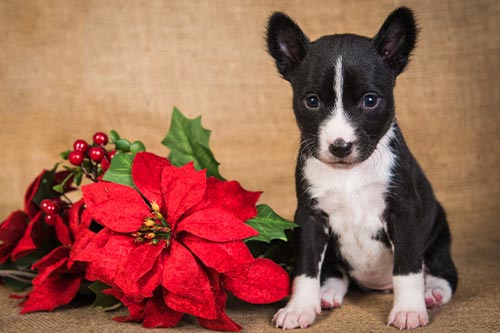Are Poinsettias Toxic to Dogs?
Poinsettias are a popular plant, especially during the holiday season, but many pet owners wonder whether they are harmful to dogs. The answer is yes, poinsettias can be toxic to dogs, though the level of toxicity is often less serious than some people think. In this blog, we’ll discuss the potential risks, signs of poinsettia poisoning, and what you should do if your dog comes into contact with the plant. If you have any concerns or need further information, feel free to call Limerick Veterinary Hospital at (610) 489-2848 or book an appointment online to speak with a veterinarian.

How Poinsettias Affect Dogs
Poinsettias contain a sap that can cause mild irritation when ingested or when it comes into contact with a dog’s skin. While the plant has a reputation for being highly toxic, the actual effects are usually mild and limited to digestive upset or skin irritation. When your dog chews on a poinsettia, they may experience symptoms like drooling, vomiting, or diarrhea. In some cases, you might notice red or irritated skin where the sap has touched them.
The level of toxicity depends on how much of the plant your dog consumes and their size. Larger dogs may only experience mild discomfort, while smaller dogs might feel the effects more strongly. Though it’s rare for poinsettia poisoning to become life-threatening, it’s always a good idea to monitor your dog closely if they come into contact with the plant. If symptoms seem severe or persist for more than a few hours, contact your vet at Limerick Veterinary Hospital for advice.
Signs of Poinsettia Exposure in Dogs
If your dog has chewed on a poinsettia, you might notice some specific symptoms that indicate irritation or discomfort. These signs are usually not severe but should be monitored to ensure they don’t worsen. Here are the most common signs:
- Mild vomiting or diarrhea: Your dog might show signs of an upset stomach, like vomiting or loose stools, after chewing on a poinsettia.
- Excessive drooling: If your dog is drooling more than usual, it could be a reaction to the sap from the plant.
- Pawing at the mouth or face: Dogs often paw at their mouth or face when they are irritated or uncomfortable, especially if they’ve eaten something that doesn’t agree with them.
- Red or irritated skin: If the sap from the poinsettia comes into contact with your dog’s skin, you may notice redness or irritation around their mouth, nose, or paws.
- Lethargy: While rare, some dogs may become a bit more tired or sluggish if they experience discomfort from eating a poinsettia.
If any of these symptoms last longer than a few hours or seem to get worse, it’s important to contact us at Limerick Veterinary Hospital. A quick call to (610) 489-2848 will allow you to speak with a vet who can provide guidance on the next steps.
What to Do If Your Dog Eats a Poinsettia
If your dog has eaten part of a poinsettia plant, the first thing to do is remain calm. While poinsettias are toxic, they rarely cause severe harm. Start by checking your dog for immediate symptoms, such as vomiting or skin irritation. Rinse their mouth or affected areas with water to help remove any sap that might be causing discomfort.
Monitor your dog’s behavior for any worsening symptoms. In most cases, symptoms will resolve within a few hours without medical intervention. However, if your dog is vomiting repeatedly, has diarrhea that doesn’t stop, or seems to be in pain, call Limerick Veterinary Hospital. We can help determine whether your dog needs to come in for treatment or whether monitoring them at home is sufficient.
If you do bring your dog in, the vet may give them fluids to prevent dehydration and offer treatments that soothe any irritation or discomfort. Most dogs recover quickly with the right care and go back to their normal selves in no time.
Other Plants to Be Aware Of
While poinsettias often get the most attention for their toxicity, there are other common household and holiday plants that can be more dangerous for dogs. Some of these include:
- Holly: Both the leaves and berries of holly can cause severe gastrointestinal upset, including vomiting and diarrhea.
- Mistletoe: This plant can cause more serious reactions, including difficulty breathing, low blood pressure, and even seizures in some cases.
- Lilies: Certain types of lilies, like peace lilies, can cause irritation, while others, like daylilies, are more dangerous and toxic, especially for cats.
- Amaryllis: This popular holiday flower contains toxins that can lead to stomach upset, drooling, and even tremors in dogs.
While poinsettias are often not the biggest threat, it’s important to keep all potentially harmful plants out of reach of your pets to prevent any accidents. If your dog comes into contact with any of these plants, especially mistletoe or lilies, contact us immediately at (610) 489-2848.
How to Keep Your Dog Safe During the Holidays
Preventing exposure to poinsettias and other toxic plants is the best way to keep your dog safe. If you have a dog that loves to explore or chew on things, here are a few simple steps you can take to minimize the risk:
- Keep plants out of reach: Place poinsettias and other plants on high shelves or in rooms where your dog doesn’t have access.
- Use artificial plants: Consider using artificial poinsettias during the holidays to create the same festive atmosphere without any risk to your dog.
- Watch for dropped leaves or petals: If you have live poinsettias in your home, regularly check for any fallen leaves or petals that your dog might chew on.
- Create barriers: Use baby gates or other barriers to keep your dog away from areas where you have holiday plants displayed.
These precautions can go a long way in preventing accidental exposure and ensuring that your holiday season remains safe for your pet.
When to Call the Vet
If you’re unsure whether your dog needs to see a vet after chewing on a poinsettia, it’s always better to err on the side of caution. While most cases result in mild symptoms, there’s always a chance that your dog could have a stronger reaction, especially if they are smaller or have other health concerns.
Call Limerick Veterinary Hospital if you notice persistent vomiting, diarrhea, or signs of discomfort that last more than a few hours. We can help assess the situation and decide if an office visit is necessary. You can reach us at (610) 489-2848 or book an appointment online to speak with a veterinarian for further guidance.
